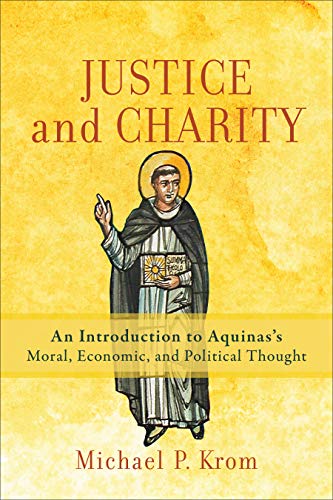Krom, Michael P. Justice and Charity: An Introduction to Aquinas’s Moral, Economic, and Political Thought. Grand Rapids, MI: Baker Academic, 2020. 235 pages. Softcover. 978-1-5409-6224-9. $32.00.
1. Introduction
There has been a revival of interest in the thought of Thomas Aquinas in conservative evangelical circles. The most recent annual meeting of the Evangelical Theological Society (2022) had a panel of papers dedicated to “Evangelical Theologians in Dialogue with Thomas Aquinas.” At the same time, some question this growing interest–sometimes quite stridently. See, for instance, Jeffrey D. Johnson’s critique of Thomism, The Failure of Natural Theology (reviewed by Jordan Steffaniak here). This review will not attempt to resolve the tension. However, Michael Krom’s book on Aquinas should help move the discussion forward in a healthy way. To appropriate or critique anyone requires prior understanding. For such a profound thinker like Aquinas, with his massive and challenging corpus, generalizations and caricatures are common. Krom has done us all a service by summarizing the insights of Aquinas in the areas of ethics, economics, and politics.
Michael P. Krom is a professor of philosophy at Saint Vincent College. In addition to teaching philosophy, he is also the director of Benedictine Leadership Studies at Saint Vincent as well as the director of the Faith and Reason Summer Program. This is his second book, and he has authored various scholarly articles as well as presented numerous papers at academic conferences.
I should state at the outset that I am not a Thomistic scholar. My graduate degrees are in Church History and Historical Theology, focusing on the worship and theology of the Reformation and post-Reformation. However, some of my research has focused on Protestant appropriations of church history. Therefore, I read this book as one who has been familiar with Thomas Aquinas for some time, but who wants to understand him better.
I believe this book will help both friends and foes of Thomas. For those who want to understand his thought better, this volume provides a good overview of Thomas’s views on ethics, economics, and politics. For those critical or suspicious of Thomas, this book will help them to engage in a more informed and productive debate.
2. Summary
As the title indicates, this book is divided into three main parts, explaining Aquinas’s main teachings on Moral Theory, Economic Theory, and Political Theory. Each part is divided into two chapters. The first chapter in each part is devoted to philosophy, while a second chapter considers the same topic from the standpoint of theology. This is in keeping with one of Aquinas’s key insights: grace perfects nature. Accordingly, in the first chapter of each section, Krom summarizes what we can know, and practice, from a merely human perspective (nature), while the second chapter of each section develops a theological understanding, which is a result of grace.
Part 1 considers Moral Theory. Chapter 1 deals with our “Natural Desire for Happiness,” which falls under the purview of Moral Philosophy. Chapter 2 covers “Grace and Perfect Happiness,” which is considered through the lens of Moral Theology.
Part 2 is devoted to Economic Theory. Chapter 3 describes the “Goods of the Earth and the Good Life”—in other words, Economic Philosophy. Chapter 4 presents Economic Theology under the heading of “The Goods of the Earth and Perfect Happiness.” Part 3 summarizes Aquinas’s thought on Political Theory. Chapter 5 is entitled “The Common Good in the Earthly City” (Political Philosophy) while Chapter 6 treats “The Twofold Citizenship of the Christian Wayfarer” (Political Theology).
Part 4 (“The Perennial Teaching of the Angelic Doctor”) extends Aquinas’s thought into the 21st century, tackling issues like abortion, use of stem cells, homosexuality, and modern economic challenges. Although Thomas did not write explicitly on most of these topics, Krom artfully takes what Aquinas wrote on similar topics, or on the foundational and dogmatic issues, and applies them to contemporary ethical challenges. Krom does this within the context of Catholic social thought (xiii).
Overall, the book offers a Thomistic account of practical philosophy (or “philosophy of human affairs”). Krom includes a helpful Chapter Guide at the beginning of the book, which summarizes the main points and argumentation of each chapter. This helps to highlight the interconnectedness and logical coherence of the Thomistic system—it is indeed a system, and each part is dependent on, and informs, other parts.
In the Introduction, Krom explains why he wrote the book. Basically, he wants to call Roman Catholics to a higher standard. He wants them to fully understand, and embrace, the calling to “be in the world but not of it” (1). As he summarizes the contemporary Catholic dilemma, his assessment resonates with the temptations that every Christian faces today. It is an age-old dilemma, but one that is perhaps more tempting in our post-modern, liberal democracies:
Catholics appear to be quite comfortable in the world, giving the impression that they are Republicans or Democrats first, and Catholics second. For all too many, being Catholic is like retaining an old-world ethnicity in the US: one privately celebrates feast days and one’s cultural heritage but in public speaks and thinks in the terms dictated by the nation (2).
Replace “Catholic” with “Baptist” or “Lutheran” (depending on where you are in the USA), and the shoe fits. Krom believes that Catholics need to recover their theological heritage, in order to live faithfully in the present (2-3). I argue that this is a pressing need for everyone claiming to follow Christ today. A thin veneer of cultural Christianity won’t cut it any longer. We need to recover the theological strength and vitality of our fathers and mothers in the faith. They were not perfect, but they have much to teach us.
But why Aquinas? Besides being only one of the four “doctors of the church” recognized by the Catholic church because of their immense influence, Aquinas is also one of the most important theologians in Western church history. Augustine and Aquinas really set the agenda and trajectory for Western theology. So, whether or not we agree with them, we do need to understand them.
But there is another reason, one more particularly related to the situation that evangelical Christians find themselves in today. In recent years, there has been a marked growth in the popularity of “public theology” and “social justice.” In fact, these buzzwords are quite trendy right now. As with most things, conservative Protestants are late to the party. “Social justice” and “public theology” were really pioneered by the Roman Catholics. In fact, “social justice” as a theological concept was popularized in an official papal document, Pius XI’s encyclical Quadragesimo Anno (1931). In this encyclical, Pius XI, “made an intensive effort to recover the idea that Aristotle and Thomas Aquinas had intended by the name ‘general justice’ and, placing this new term in the context of rapid social change, gave it a new name: “social justice’” (Michael Novak and Paul Adams, Social Justice Isn’t What You Think It Is, 108).
In Catholic terms, “public theology” is termed “Catholic social teaching.” And, as Krom notes, when Pope Leo XIII initiated serious theological engagement with, and critique of, modernity in his encyclical Aeterni Patris (1879), he drew heavily on Aquinas. Additionally, in his “landmark encyclical Rerum Novarum (1891), Leo provided a model of applying Aquinas’s insights to the ‘brave new world’ of modern politics and society” (5). So, Catholic Social Teaching (CST) is anchored in Thomism. Just as we can learn from the Catholic opposition to abortion, which predated conservative evangelical concern about the issue, so we can learn from earlier thinkers who were engaging in “public theology” long before we were.
3. Evaluation
This book obviously is written from a Roman Catholic perspective. However, the explicitly Catholic emphases were more like frosting on a cake. Krom focuses more on the elements of Thomas’s thought that fit readily within the “Great Tradition.” That makes it easier to sift out some of the distinctively Roman Catholic flavors that occasionally float to the top of this Thomistic stew (to mix the metaphor).
The great strength of Aquinas’s thought, as summarized by Krom, is the insistence that everything be considered in light of its “end” or telos. Accordingly, Krom does an admirable job of carefully distinguishing the various goals/ends of human life, based on “nature” (God’s design and plan for the world) as well as revelation. Again, this is valuable for evangelical Protestants, who are sometimes satisfied with a Biblical proof-text, without taking the trouble to think through the deeper philosophical and theological implications and foundations of our beliefs and actions. Krom also utilizes many examples of ethical dilemmas based in our ordinary experiences, to help the reader think through the various goals, or ends, of virtues and vices in the realms of ethics, economics, and politics.
One minor criticism is that in his treatment of Thomistic economics, Krom does not (as far as I could tell) refer, or even list as a reference, Mary L. Hirschfeld’s Aquinas and the Market: Toward a Humane Economy (2018), although he does mention Hirschfeld’s 2006 essay on Aquinas and economics.
One of the most helpful sections of this book is actually the concluding chapter. While the bulk of the book requires a bit of dedication to get through the careful Thomistic analysis, the conclusion takes Aquinas and “updates” him for the 21st century. In doing so, Krom provides a helpful introduction to Catholic Social Teaching (CST), which might be unfamiliar to the average evangelical Protestant. As Krom takes the insights of Aquinas and applies them to the challenges of a modern, globalized, market economy, or when he explains the difference between Aquinas’s view of “rights” and the modern view of “social justice,” he exemplifies the process of how to use the insights of the Great Tradition to tackle contemporary challenges.
4. Conclusion
Although I disagree with his Roman Catholicism, I believe Krom’s basic approach is valuable—even necessary, to bring the healing unity of the Gospel to the fragmentation of our times. As we plunge headlong into a post-Christian world, we need to draw on all the resources that God has given his Church. One can appreciate and learn from the insights of a medieval Catholic like Aquinas, without crossing the Tiber. Additionally, in the days to come, we may find that we have more in common with our conservative Roman Catholic friends than with our liberal Protestant friends. As what Francis Schaeffer termed “co-belligerents,” we should at least understand the theological perspectives of our allies, even as we continue to engage in spirited debates.
Author
-
 Dr. Gregory Soderberg is a Fellow of Classical Humanities and Theology at the Beza Institute. He teaches and mentors students of all ages at Kepler Education, the Alexandrian Institute, the BibleMesh Institute, and Redemption Seminary. His writings have appeared in Touchstone, SALVO, Common Good, American Reformer, and Intellectual Takeout. His most recent book is John Brown of Haddington on Frequent Communion. You can follow him on Substack or X.View all posts
Dr. Gregory Soderberg is a Fellow of Classical Humanities and Theology at the Beza Institute. He teaches and mentors students of all ages at Kepler Education, the Alexandrian Institute, the BibleMesh Institute, and Redemption Seminary. His writings have appeared in Touchstone, SALVO, Common Good, American Reformer, and Intellectual Takeout. His most recent book is John Brown of Haddington on Frequent Communion. You can follow him on Substack or X.View all posts




